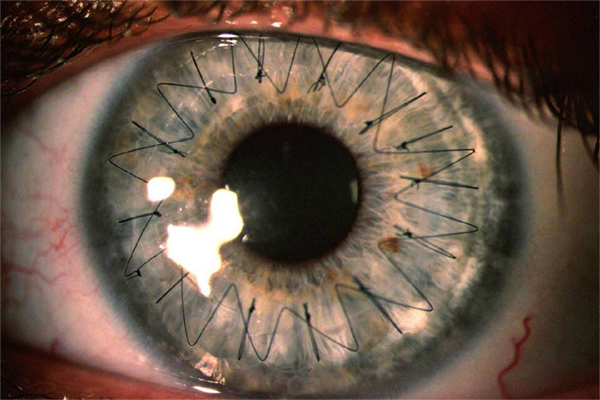Table of Contents
One of the most common problems that can occur in many people is corneal problems. Today, working with advanced tools and equipment such as laptops or cell phones puts more strain on the muscles and nerves of the eye. For this reason, you should not ignore any damage to the cornea or pain in the eye area, and in case of problems and pain, it is better to see a doctor.
One of the best treatments for corneal problems is corneal transplantation or keratoplasty, which is widely used around the world today. In this method, you need a corneal donor. For this reason, the process of corneal transplant surgery is sometimes difficult. In this article from the Moj Aramesh Amitis Health Tourism Company, we are going to talk in full about the complications of corneal transplant surgery.

What is keratoplasty
Keratoplasty or corneal transplantation is one of the eye surgery methods to treat and change the cornea of the eye. In this case, the cornea donated by someone else should be used and it should replace the main cornea. There are several methods for performing keratoplasty./ Corneal transplantation in Iran
There are two main methods for corneal transplantation, depending on the type of patient’s eye. In the first method, if the entire cornea of the eye is damaged and under pressure and needs to be replaced, the surgeon must replace the entire cornea with a donated cornea.
In another procedure for keratoplasty, the doctor changes only a small part of the cornea. This type of surgery is called layered keratoplasty.
It is very important to solve the problem related to the cornea of the eye and to perform keratoplasty surgery, and in most cases, people with corneal diseases lose their sight and vision completely after a while. The disease can be caused by genetic problems or even pressure and damage to the cornea of the eye.
Fortunately, the rate of keratoplasty surgery has increased somewhat in recent years. So that thousands of people around the world regain their sight by performing this surgery.
Who is a good candidate for keratoplasty
In corneal transplant surgery, the main issue is not the color of the cornea and the discoloration of the cornea of the eye, but any problem and damage to the cornea of the eye causes the person to have to wear glasses. Also, very severe injuries cause a person to become blind.
To determine if you are a good person for a corneal transplant or keratoplasty, you should have your cornea thoroughly examined, and be sure to see your doctor if you have pain or swelling or vision loss. Sometimes damage to the cornea causes part of the eyelids to come in contact with the surface of the eyeball.
This can lead to an eye infection over time. An ophthalmologist will usually invite you for keratoplasty surgery when other treatments, such as contact lenses or glasses and medications and eye drops, are not helpful in relieving your pain and swelling or deviation.
Cataract is one of the most important factors in diagnosing corneal eye surgery. In severe cases, the ophthalmologist tries to solve this problem with the help of surgery. Also, burns or contact of dangerous and toxic substances with the cornea of the eye or genetic diseases such as deformity of the cornea and its thinning and inflammation and infection are common cases that can be treated through corneal transplant surgery.
What are the complications and risks of corneal transplantation
This treatment, like other surgical and medical treatments in medicine, can have side effects. These complications can vary depending on the surgery and the extent of your eye problem. One of the most common complications you may experience after keratoplasty surgery is an infection and inflammation of the eyeball.
The surgeon tries to prevent infection and inflammation on the cornea of the eye by prescribing drugs and antibiotics due to wounds and incisions on the cornea of the eye. However, if the postoperative care is not done properly, there is a possibility of infection at the wound site.
Another complication that can occur after a corneal transplant is increased pressure and pain in the eye area. This is called glaucoma, which can be very painful for a person. Because in this case, the newly transplanted cornea puts pressure on the eyeball and presses all the nerves of the eye.
As a result, the quality of your vision is impaired by causing pain inside the eyes. See your doctor right away if you have any problems with pressure on your eyes after keratoplasty surgery.
Other complications associated with corneal transplantation are blurred vision. Sometimes blurring of the eyes may be temporary and go away after recovery. But if this problem does not go away after a few days, your eyes should be examined by an ophthalmologist.
Another complication of keratoplasty is swelling of the cornea of the eye. The doctor can diagnose this with a physical observation. A corneal infection can be very dangerous because in addition to causing severe pain to you, it can also cause vision problems. If the doctor does the eye suture well, there is a possibility of scarring and scarring at the suture site.
How likely are complications after corneal transplant surgery
The extent of complications after corneal transplantation depends entirely on the experience and skill of the surgeon and the keratoplasty procedure. Also an effective factor on the type and severity of the complication after corneal transplantation is the amount of pain and inflammation and infection in your eye.
Corneal transplantation is considered an almost safe procedure. In recent years, there have been many cases that performed keratoplasty well and did not face any particular problem. If you are worried about complications after keratoplasty, it is best to prepare well for surgery before the operation and consult your doctor about it.
Observing the surgeon’s portfolio and knowing the physician’s experience and skills can also be an effective factor in reducing the risk of complications after keratoplasty surgery. Also, try to take good care of your eyes and the area after the operation. Do not expose your eyes to light. You will probably not be able to see anything for several days and your eyes will be closed.
After you open your eye dressing, try not to put pressure on your eyeball by using a laptop or phone or reading. Doing all of these things can go a long way in preventing complications after keratoplasty surgery.
What does pre-corneal transplant preparation include
To perform keratoplasty, prevention of postoperative complications and preoperative preparation are very important. The most important thing is to have a thorough examination of your eyes by an ophthalmologist. Your ophthalmologist should be skilled enough to diagnose your corneal problems and suggest the best treatment. Sometimes diagnosing which eye treatment method to use is very complicated and difficult.
The next step performed by the ophthalmologist is to determine the exact dimensions of your cornea. Because with this, you have to request a corneal donation from the corneal donor center, and the first thing that will be examined after the request is the dimensions of your cornea.
Before keratoplasty, many medications must be discontinued as directed by a specialist. For example, if you are taking certain supplements or medications, it is best not to take them for one to two weeks before surgery. Smoking and alcohol should generally be stopped one month before surgery.
Sometimes a specialist surgeon will try to reduce other problems in your eyes with medication and other treatments before operating on the cornea. For example, you may have to use special lenses for several months to first treat other eye diseases. Once you have done all the preparation for the keratoplasty, the next step is to find someone to donate the cornea to your eyes.
The cornea of the eye is usually removed from the eyes of the deceased. The number of corneas for eye transplantation in the world and in Iran is very high and patients will not have any problems for corneal transplantation.

Keratoplasty in Iran
Keratoplasty in Iran is performed by skilled and experienced physicians in the field of treatment and surgery of various eye diseases at a very reasonable cost. Of course, this cost varies depending on the type of eye disease and the keratoplasty procedure. Surgeons who are more reputable also pay more for corneal transplants.
In Iran, there are not many problems for corneal donation and there have been many people who have regained their sight in recent years with the help of this method and have treated infections and diseases related to the cornea of the eye.
Concluding remarks
In this article, we made some remarks about the complications of corneal transplant surgery from Moj Aramesh Amitis Health Tourism Company. Corneal transplantation is generally considered a safe procedure. But if done by a novice and inexperienced doctor, there is a possibility of problems and complications.
Since keratoplasty is a common method of treating eye diseases, there are different doctors in this field. Dear ones, you can contact the experts of Moj Aramesh Amitis Health Tourism Company for keratoplasty surgery in Iran and be relieved of the result of the operation.




